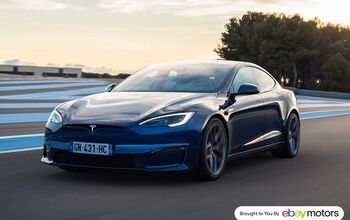Honda Exec: Chinese and Indian Automakers Could "Blow Up The Distribution Chain"
The prospect of US launches by Chinese and Indian auto brands like Tata and BYD have at least one of the established US-market players in a paranoid froth. Honda VP John Mendel revealed a few of the nightmare scenarios that keep him up at night to USA Today [UPDATE: more on Mendel’s fears at Automotive News [sub]]. One, inspired by BYD’s plans for a 2010 US launch without a distribution channel in place, is that newcomers could skip the dealer model altogether. Mendel worries that “warehouse stores or electronics stores” ( sound familiar?) could be used to cut dealers out of the loop, “blowing up” business-as-usual for US distribution strategy.
Mendel’s fear clearly owes something to the post-9/11 paranoia of asymmetrical warfare: a new enemy, exploiting its smaller size to wreak havoc on an already-fragile system. Happily for America and its fine car dealers, fears of such asymmetry are typically overplayed. An industry that lives and dies on volume isn’t likely to be dominated by a firm that rejects a large-scale, dedicated distribution network. A BYD could theoretically get a toehold by selling its EVs through some other retail chain, but there’s nothing in the history of the car game to suggest BYD could really become a Toyota-challenging global player (as it aims to) without securing a US dealer network.
Mendel’s second mania is based on a equally shrewd insight into the American psyche, specifically our love for all things disposable. Like his direct-marketing theory though, it takes the insight a little too far. The prospect of a US-market version of a Tata Nano has Mendel worried that Americans could become accustomed to the concept of a “disposable automobile,” to the detriment of established players like Honda. He quails:
If you’ve just spent a few thousand dollars on a car, and it needs repairs, maybe you won’t fix it. Maybe you’ll decide you want a new one in a different color, and just get another one.
Maybe. Or, maybe you’ll decide you’re tired of driving a Kei car and buy something that can go faster than 70 MPH. Besides, a US-market Nano would still cost well over $5,000, which is probably enough to discourage too much disposable car mania.
More by Edward Niedermeyer
Latest Car Reviews
Read moreLatest Product Reviews
Read moreRecent Comments
- MaintenanceCosts I wish more vehicles in our market would be at or under 70" wide. Narrowness makes everything easier in the city.
- El scotto They should be supping with a very, very long spoon.
- El scotto [list=1][*]Please make an EV that's not butt-ugly. Not Jaguar gorgeous but Buick handsome will do.[/*][*] For all the golf cart dudes: A Tesla S in Plaid mode will be the fastest ride you'll ever take.[/*][*]We have actual EV owners posting on here. Just calmly stated facts and real world experience. This always seems to bring out those who would argue math.[/*][/list=1]For some people an EV will never do, too far out in the country, taking trips where an EV will need recharged, etc. If you own a home and can charge overnight an EV makes perfect sense. You're refueling while you're sleeping.My condo association is allowing owners to install chargers. You have to pay all of the owners of the parking spaces the new electric service will cross. Suggested fee is 100$ and the one getting a charger pays all the legal and filing fees. I held out for a bottle of 30 year old single malt.Perhaps high end apartments will feature reserved parking spaces with chargers in the future. Until then non home owners are relying on public charge and one of my neighbors is in IT and he charges at work. It's call a perk.I don't see company owned delivery vehicles that are EV's. The USPS and the smiley boxes should be the 1st to do this. Nor are any of our mega car dealerships doing this and but of course advertising this fact.I think a great many of the EV haters haven't came to the self-actualization that no one really cares what you drive. I can respect and appreciate what you drive but if I was pushed to answer, no I really don't care what you drive. Before everyone goes into umbrage over my last sentence, I still like cars. Especially yours.I have heated tiles in my bathroom and my kitchen. The two places you're most likely to be barefoot. An EV may fall into to the one less thing to mess with for many people.Macallan for those who were wondering.
- EBFlex The way things look in the next 5-10 years no. There are no breakthroughs in battery technology coming, the charging infrastructure is essentially nonexistent, and the price of entry is still way too high.As soon as an EV can meet the bar set by ICE in range, refueling times, and price it will take off.
- Jalop1991 Way to bury the lead. "Toyota to offer two EVs in the states"!


































Comments
Join the conversation
One problem any newfangled seller of automobiles faces is how to deal with the trade-in problem. I suppose they could simply sell all of their trades to CarMax or at auction though.
How wonderful wouldn't that be! Buy a car from anyone, anywhere, without having to worry about dealer this and dealer that. I can see American Honda, which is already stuck in idiotic contracts with politician sponsored (or was it the other way?) car dealers being a bit worried, though. For the rest of us, regulatory arbitrage is always a good thing, just as it was when the Japanese brands "circumvented" the UAW. As pertains to disposability, the more cars rely on rapidly changing and changeable electronics and software, the shorter their reasonably up to date shelf lives will become. And if necessary electronics becomes what's limiting cars' longevity, over engineering the mechanicals becomes simply a waste.